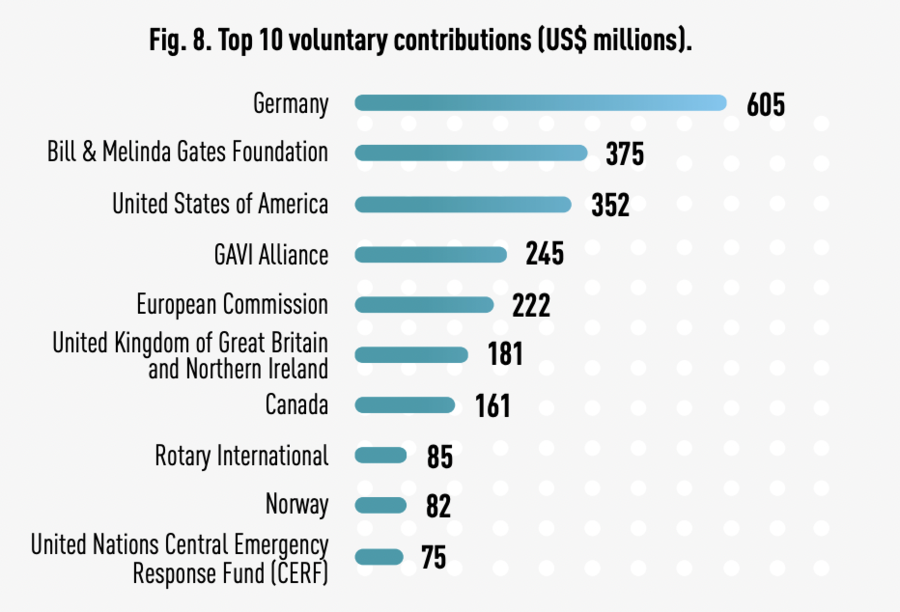
Do contributions from Bill Gates make up 88 percent of the World Health Organization's annual funding? No, that's not true: While notable, the total amount donated by the Bill and Melinda Gates Foundation every year did not exceed 10 percent of the WHO budget in recent years. The claim misrepresents the structure of WHO's funding.
The claim appeared in a post (archived here) published on Instagram on December 19, 2023. It stated:
🚨People's Freedom Movement Protestors marchingand chanted "Arrest Bill Gates, Arrest Bill Gates"
Gates is responsible for 88% of Funding" for the World Health Organization & largest Owner of US Farmland, we need MUCH more of this👏🏽👏🏽👏🏽👏🏽👏🏽👏🏽
This is what it looked like at the time of writing:
(Source: Instagram screenshot taken on Mon Jan 8 16:20:53 2024 UTC)
According to the most recent available audited report (archived here) for the 2020-2021 financial year, $375 million donated by the Bill & Melinda Gates Foundation is not 88 percent of the $4.07 billion WHO's total revenue for that period -- it's only 9.2 percent.
In a typical year, donations from all philanthropies make up about 10 percent of WHO's funds (archived here.)
In comparison, voluntary contributions that come from the 196 member states account for roughly 40 percent of the organization's funds, as seen in the WHO budget breakdown (archived here.) It also lists other categories counted separately.
In 2020-2021, the Bill and Melinda Gates Foundation was listed as the second-largest voluntary contributor after Germany -- but this graph does not include total amounts coming from member states:
(Source: WHO screenshot taken on Jan 8 14:26:10 2024 UTC)
According to the WHO website (archived here), the organization's budget consists of different types of contributions.
One is mandatory fees paid by the 196 member states, also known as "assessed contributions" based on a percentage of a country's GDP (an approximate breakdown for the 2022-2023 financial year can be seen here.)
This type of funding accounts for less than 20 percent of the WHO budget.
Another category that grew between the 1990s and 2020s is "voluntary contributions." That may come from either member states -- in addition to their mandatory dues -- or from others, including philanthropies. Only a small portion (4.1 percent) of what comes from state members in this category is allocated for nonspecified spending. But most voluntary contributions -- 88 percent -- are tied to a specific region, disease or project, as the WHO website explains.
In 2018-2019, when the United States, then the largest donor, contributed 15 percent of the WHO's budget in voluntary donations. The respective figure for the Bill and Melinda Gates Foundation was less than 9 percent (archived here.)
In the late 2010s, that produced concerns (for example, here) that such budgeting allowed an increased influence of private philanthropies -- first and foremost, the Bill and Melinda Gates Foundation -- in setting WHO's priorities.
In 2020, WHO Director-General Tedros Adhanom Ghebreyesu acknowledged that the organization needed more flexible funding (archived here) not attached to a specific program or disease.
In 2023, member states agreed on a 20 percent increase in mandatory contributions (achieved here) that the WHO can manage according to its current priorities. The organization's press release additionally stated (archived here) that member states "target a gradual increase of their assessed contributions (membership dues) to represent 50% of WHO's core budget by the 2030-2031 budget cycle, at the latest," increasing a share of what the organization could spend on its priorities before.
A detailed breakdown of the donations from the Bill and Melinda Gates Foundation to the WHO is available on the website of the former.
Other Lead Stories fact checks mentioning Bill Gates can be found here.

















